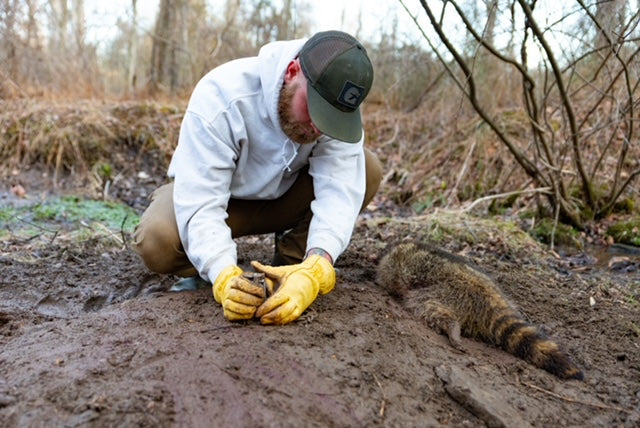By: Ryan Davis
April 8, 2024
SPRING TRAPPING
Tips for increasing the odds of survival for wild turkeys

As an avid turkey hunter and conservationist, the spring sunshine and the warmer temps has my mind wandering off to one thing - Spring turkey season and chasing these birds across the states. My love of chasing big toms drives me to manage my properties for nesting success. From late January until hen nesting begins, my focus is on trapping and predator management to aid the nesting/survival rate of turkeys on my farms and surrounding areas.
Effective predator management must be intensive and practiced at the right time; before nesting occurs. Trapping and nesting rate success and reproduction of wild turkeys go hand in hand. The odds are stacked against the wild turkey from the get-go. 40 to 60 percent of turkey nests will be eaten before they’re even hatched. Several studies on Eastern Wild Turkey poults show that 56 to 73 percent will die in their first two weeks of life almost exclusively from ground predation.
During brooding, a hen will incubate her eggs for 28 days, leaving her very susceptible to predation. Maintaining the predator population is crucial in increasing their odds of survival, especially with “nest raiders“ such as raccoons, opossums, and skunks. If poults make it past the hatching stage their next enemies are fox, coyote, and bobcats.
There are speculations on why the wild turkey population is on a downward trend. The main reasons are believed to be a loss of habitat, poor weather conditions, and increased predation. Some of these are out of our control as individuals, but with trapping, we can up their odds significantly. Increasing hatchling rates and lowering the chance of predation puts a card back in the hand of turkey populations.
The wild turkey is such a valuable and sensitive resource. Many organizations such as the NWTF and Turkeys For Tomorrow as well as influencers Dave Owens, Hunter Farrior, and countless others are promoting hunters to get out and try their hand at trapping to save the poults!


As far as baits go, you can use about anything smelly in your pantry: cheap cat or dog food, marshmallows, sardines… anything that will draw the predators near. I've had my best success this season on dog food mixed with black licorice pieces and blended with bacon grease. Being that a raccoon's biggest enemy is his own nose; if it smells good to you, it smells great to them!
As with any game that you pursue, look for signs of the animals that you are targeting. I focus on creek beds, log crossings, large trees with crevices and holes as well as old, abandoned buildings and structures where they may den at. Find fresh signs and focus on these areas and I assure you that you will have success!
"Increasing hatchling rates and lowering the chance of predation puts a card back in the hand of turkey populations."
It is important as outdoorsmen to give back and help manage our fragile resources as much as we can. Predator management must be conducted repeatedly over time because predators recolonize even managed areas at rapid rates. Predator management increases the prey population, which naturally attracts predators. If you're going to trap and hunt predators, go out and do it safely, respectfully, and understand that you will see positive results if you trap annually.

Gator Waders Hunting Gear
-
Regular price$129.99Regular priceSale price$129.99 Save $-130.01 (%)Unit priceper
Camp Boots | Mens - Mossy Oak Bottomland
-
Regular price$599.99Regular priceSale price$599.99 Save $-600.01 (%)Unit priceper
Omega Uninsulated Zip Waders | Mens - Mossy Oak Bottomland
-
Regular price$69.99Regular price
$139.99Sale price$69.99 Save $69.98 (50%)Unit priceperHip Boots | Mens - Brown
-
Regular price$499.99Regular priceSale price$499.99 Save $-500.01 (%)Unit priceper
Shield Insulated Waders | Mens - Mossy Oak Bottomland
You may also like
-

Quack Shack's Migration Tour
In this episode the boys meet up with Dirty Duck Coffee in Alberta Canada. We talk about the start of...
-

Wildly Edible : Blackened Redfish Tacos
Fish tacos are always in the dinner rotation, especially when the fish are biting. This blackened redfish taco recipe is full of flavors...
-

Summer Dog Training
With the mercury running up like the price of diesel, we’re all looking for ways to keep our dogs on...
-

Wildly Edible : Turkey Nuggets
What separates one turkey nugget recipe from another? It starts with your marinade and dredge. This southern fried wild turkey nugget recipe will...











